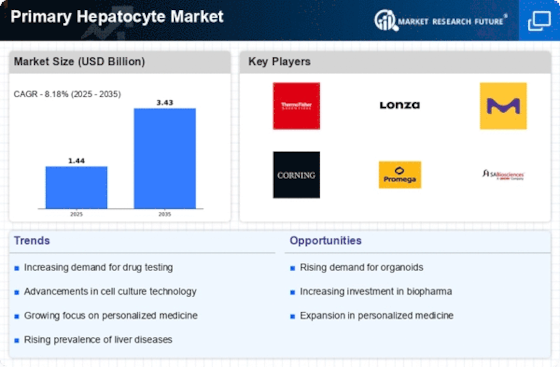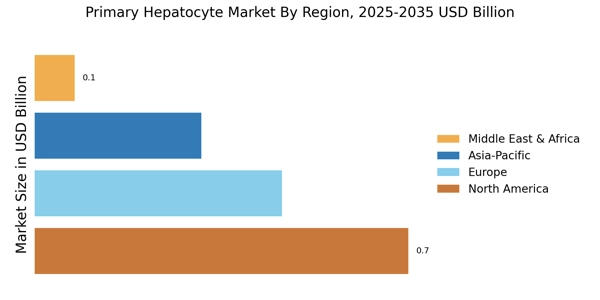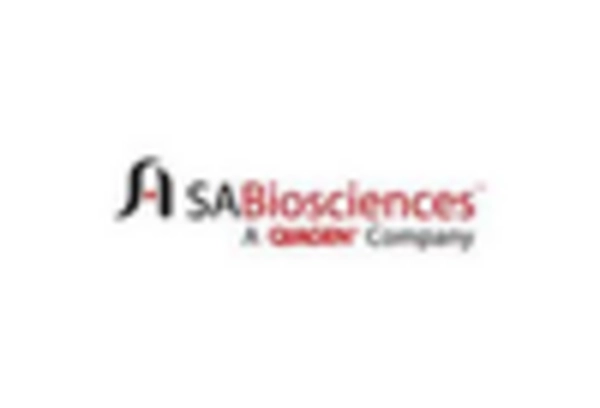Growing Investment in Drug Discovery
The surge in investment directed towards drug discovery and development is a notable driver for the Primary Hepatocyte Market. Pharmaceutical and biotechnology companies are allocating substantial resources to research and development, particularly in the field of liver diseases. This trend is reflected in the increasing number of partnerships and collaborations aimed at advancing drug discovery processes. Primary hepatocytes play a critical role in these efforts, as they are essential for understanding drug metabolism and toxicity. The market is likely to benefit from this influx of funding, as companies seek to enhance their research capabilities and improve the efficiency of their drug development pipelines. The emphasis on innovative therapies and personalized medicine further fuels this investment, positioning primary hepatocytes as a vital component in the evolving landscape of drug discovery.
Increasing Prevalence of Liver Diseases
The rising incidence of liver diseases, including hepatitis and cirrhosis, is a primary driver for the Primary Hepatocyte Market. As liver-related ailments become more prevalent, the demand for effective treatment options and research tools intensifies. According to recent data, liver diseases account for a significant percentage of global morbidity and mortality, necessitating innovative therapeutic approaches. Primary hepatocytes are crucial for drug testing and development, as they closely mimic in vivo liver functions. This growing need for reliable models in preclinical studies is likely to propel the market forward, as pharmaceutical companies seek to enhance their drug discovery processes. The increasing focus on liver health and the need for personalized medicine further underscore the importance of primary hepatocytes in research and therapeutic applications.
Regulatory Support for Drug Development
Regulatory bodies are increasingly recognizing the importance of primary hepatocytes in drug development, which serves as a significant driver for the Primary Hepatocyte Market. Guidelines that emphasize the use of human-derived cells for toxicity testing and drug efficacy studies are being established. This regulatory support encourages pharmaceutical companies to utilize primary hepatocytes in their research, as these cells provide more relevant data compared to traditional models. The push for more stringent safety assessments in drug development is likely to increase the demand for primary hepatocytes, as they offer a more accurate representation of human liver responses. As regulatory frameworks evolve, the market for primary hepatocytes is expected to expand, driven by the need for compliance with these new standards.
Rising Awareness of Personalized Medicine
The growing awareness and demand for personalized medicine are driving the Primary Hepatocyte Market. As healthcare shifts towards more individualized treatment approaches, the need for accurate models that reflect patient-specific responses becomes increasingly important. Primary hepatocytes, derived from human donors, provide a unique opportunity to study drug interactions and liver function in a personalized context. This trend is supported by the increasing recognition of the limitations of traditional animal models in predicting human responses. The market for primary hepatocytes is expected to expand as researchers and clinicians seek to develop tailored therapies that optimize patient outcomes. The integration of primary hepatocytes into personalized medicine frameworks highlights their critical role in advancing therapeutic strategies and improving the overall efficacy of treatments.
Technological Advancements in Cell Culture
Technological innovations in cell culture techniques are transforming the Primary Hepatocyte Market. Enhanced methods for isolating and maintaining primary hepatocytes have emerged, leading to improved viability and functionality of these cells in laboratory settings. Recent advancements, such as 3D cell culture systems and bioreactor technologies, allow for more accurate modeling of liver physiology. These innovations not only facilitate better drug metabolism studies but also support the development of personalized medicine approaches. The market for primary hepatocytes is expected to grow as researchers increasingly adopt these advanced technologies, which provide more reliable data for drug testing and toxicity assessments. The integration of automation and high-throughput screening methods further enhances the efficiency of hepatocyte-based research, making it a pivotal area of growth within the industry.

















